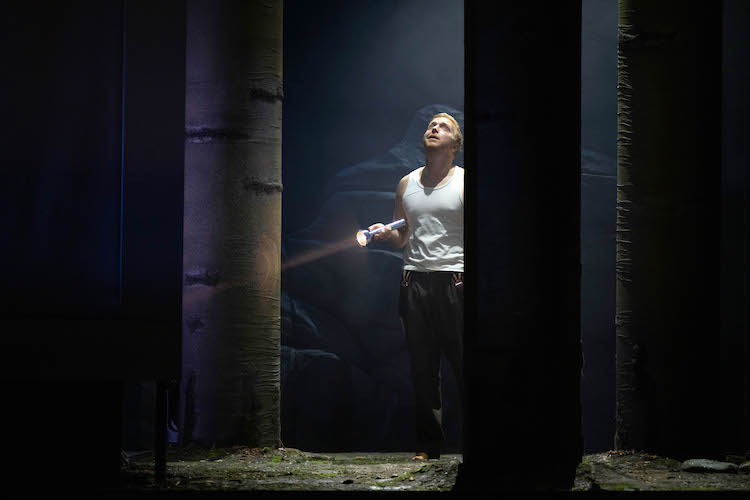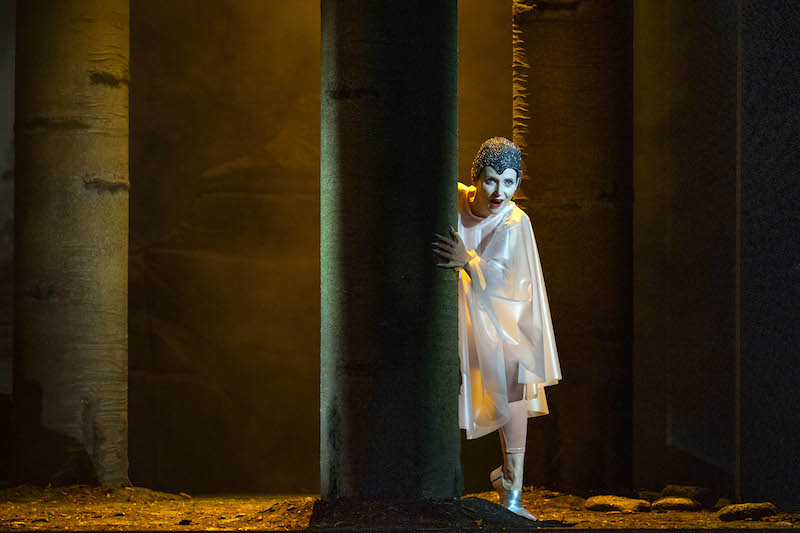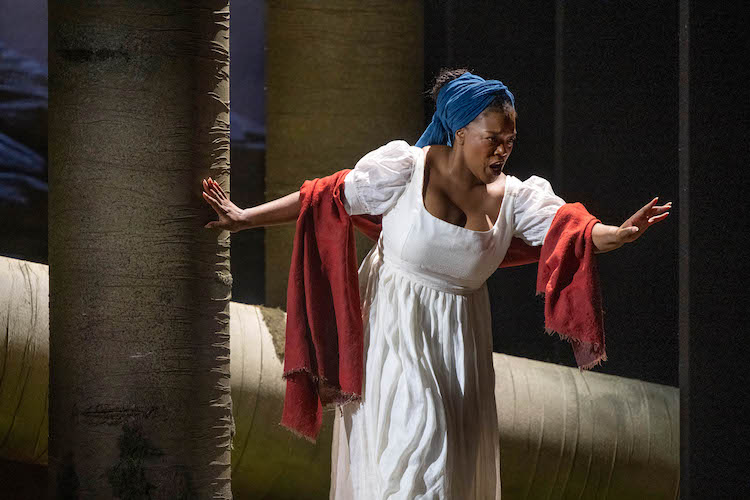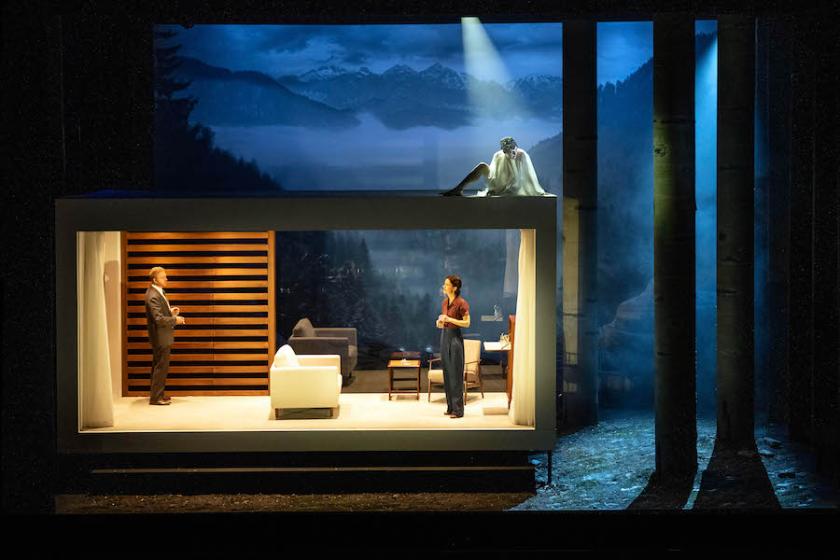Judith Weir’s Blond Eckbert, presented by English Touring Opera at the Hackney Empire, at the beginning of its tour (paired with The Snowmaiden, reviewed on theartsdesk last week) has all the biggest virtues of her work in spades: it is narratively lean, razor sharp in its scoring, and alluring in it its dressing up of the strange in the comforting garb of the familiar.
This production uses the “pocket version” of the 1994 opera, Weir’s own libretto based on an 1897 German Romantic novella, and kind-of updates it to a mid-20th century aesthetic. But the dark deeds afoot in the woods have a timeless quality.
The woods in question are those of the German Harz Mountains. I too once experienced dark deeds while in the Harz mountains: on a summer’s evening in 1986 I listened in an attic room of a Harz Mountains spa hotel as Diego Maradona’s “Hand of God” goal robbed England of World Cup glory. In Blond Eckbert the story is even worse: the apparently happy life of Eckbert and his wide Berthe is turned on its Freudian head by the arrival of their mysterious friend Walther, who doesn’t long outlast the encounter. The whole thing is narrated and observed by a bird, whose wordless melismas are one of the musical fingerprints of the opera. Originally heard at ENO in a scoring for full orchestra, Weir made this reduced version – for an ensemble of ten players – in 2006, and it is very successful, taking the already stripped-down orchestration of the original and making it even more transparent. It allows for an easy balance between stage and pit. The characters are caught in a netherworld where realism and symbolism meet, like puppets whose fate is out of their control, making Eckbert’s helpless reaction to the revelations about his marriage all the more moving. Alex Otterburn (pictured above) has angst aplenty, showing his earlier self-control to have been a mask.
Originally heard at ENO in a scoring for full orchestra, Weir made this reduced version – for an ensemble of ten players – in 2006, and it is very successful, taking the already stripped-down orchestration of the original and making it even more transparent. It allows for an easy balance between stage and pit. The characters are caught in a netherworld where realism and symbolism meet, like puppets whose fate is out of their control, making Eckbert’s helpless reaction to the revelations about his marriage all the more moving. Alex Otterburn (pictured above) has angst aplenty, showing his earlier self-control to have been a mask.
The set is a kind of Mies van der Rohe modernist pod, furnished with 60s chic, in the middle of a brooding forest. Berthe (Flora McIntosh), is as buttoned-up as her tailored pantsuit, but she too collapses in the face of the unfolding story. Her long autobiographical aria was sung with eloquent restraint. Walther (William Morgan) is a shape-shifting supernatural presence, who broods from the moment he arrives, incongruously dressed as a kind of rustic workman, at odds with his pair of “friends”. There are motifs of German Romanticism in abundance: the forest setting, submerged secrets and hinted-at violence, the supernatural, talking animals. Ludwig Tieck took these tropes and turned them into a literary folklore. Weir’s response is to set long agonised vocal lines in a Romantic vein – but to garland them with orchestration that dances around the vocals, commenting ironically, undermining rather than supporting what the characters think they are saying. And the epitome of this is the Bird, wonderfully sung by Aoife Miskelly (pictured above), who sits outside the main action, and whose mellifluous arabesques are both beautiful and chilling.
There are motifs of German Romanticism in abundance: the forest setting, submerged secrets and hinted-at violence, the supernatural, talking animals. Ludwig Tieck took these tropes and turned them into a literary folklore. Weir’s response is to set long agonised vocal lines in a Romantic vein – but to garland them with orchestration that dances around the vocals, commenting ironically, undermining rather than supporting what the characters think they are saying. And the epitome of this is the Bird, wonderfully sung by Aoife Miskelly (pictured above), who sits outside the main action, and whose mellifluous arabesques are both beautiful and chilling.
Director Robin Norton-Hale conjures a sense of claustrophobia, the three main characters trapped inside the pod, and inside the forest, and inside their own story. Conductor Gerry Cornelius gave a colourful account of the score (horn and harp prominent), and designer Eleanor Bull creates a stylish and striking look under the restraints of a touring production. The first half of the evening was less successful, a slightly peculiar ragout of song cycles and scenas from around the time that Tieck was writing. Pitting CPE Bach against Schubert, Haydn, Beethoven and Martines, made for uncomfortable shifts of language (both musical and verbal). The ensemble, here on period instruments, were far from impeccable in their intonation, and the narrative, such as it was, awkwardly imposed. The singers overcame the limitations of the piece, soprano Abigail Kelly (pictured above) in particular. She floated and flew and held everything together – and baritone Mark Nathan also impressed in Beethoven’s An die ferne Geliebte.
The first half of the evening was less successful, a slightly peculiar ragout of song cycles and scenas from around the time that Tieck was writing. Pitting CPE Bach against Schubert, Haydn, Beethoven and Martines, made for uncomfortable shifts of language (both musical and verbal). The ensemble, here on period instruments, were far from impeccable in their intonation, and the narrative, such as it was, awkwardly imposed. The singers overcame the limitations of the piece, soprano Abigail Kelly (pictured above) in particular. She floated and flew and held everything together – and baritone Mark Nathan also impressed in Beethoven’s An die ferne Geliebte.















Add comment